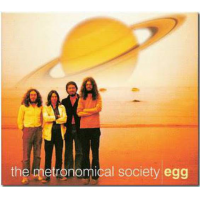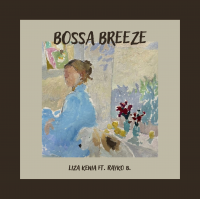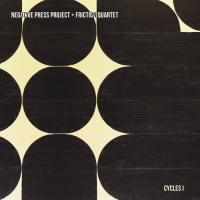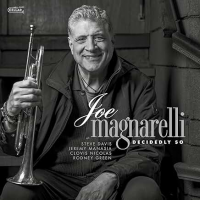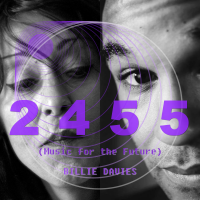Home » Jazz Articles » Extended Analysis » Uriel / Arzachel / Egg: Uriel and Egg: The Road to Hatfi...
Uriel / Arzachel / Egg: Uriel and Egg: The Road to Hatfield and Beyond
Egg's three studio discs—Egg (Nova/Deram, 1970), The Polite Force (Deram, 1971) and its posthumous swan song, The Civil Surface (Caroline, 1974)- -are now back in print on carefully remastered CDs, thanks to the archival efforts of Britain's Eclectic/Esoteric Records. Uriel's sole release, however, the very limited Arzachel (Evolution, 1969), has remained something of the Canterbury completist's Holy Grail— commanding as much as 600GBP on the open market. It's a remarkable figure, considering the album was produced for a little more than a third of that amount when it was recorded in 1969.
With the recent releases of Hatfield And The North's archival discs— Hatwise Choice: Archive Recordings 1973-1975, Volume 1 and Hattitude Choice: Archive Recordings 1973-1975, Volume 1—the addition of two more archival issues, Arzachel Collectors Edition and The Metronomical Society, coordinated by the band members and distributed through Burning Shed, fill in a blank, not just in the careers of the musicians involved, but of the Canterbury scene in general.
 Uriel
Uriel Arzachel Collector's Edition
Egg Archive
2007
While Uriel and Egg are considered Canterbury bands, it was at the City of London School that Stewart and Hillage first met, with the Egyptian-born Campbell a later acquaintance made in 1966. Like many teenagers growing up at the time, the influence of groups like Cream, Jimi Hendrix Experience, The Nice and John Mayall's Bluesbreakers loomed large, and the three began playing together, finally recruiting drummer Clive Brooks through an advertisement in Melody Maker.
Starting initially as a cover band, it was when Stewart, Campbell and Hillage began writing that Uriel began to develop its own sound, a cross between Hillage's blues and psychedelia-informed playing, Campbell's more studied approach, and the voracious Stewart, who seemed to soak up everything around him like a sponge—most importantly the influence of Campbell, whose classical background may have been less evident in the group's early days, but would begin to manifest itself more strongly over the next couple years. Uriel's original music may have leaned more towards lengthy psychedelic jam excursions, but as early as 1968 Campbell was teaching Stewart his own arrangement of Gustav Holst's "Saturn, The Bringer Of Old Age" from The Planets (1914-1916).
While Uriel managed to gig a fair bit, most notably in 1968 at the Ryde Castle Hotel referenced on The Polite Force's "A Visit To Newport Hospital," the quartet became a trio when Hillage decided to leave to study for his final university entrance exams. In many ways this was a good thing, despite Hillage's surprisingly mature guitar work at such a young age, as it was clear that the guitarist's stylistic proclivities were at odds with Campbell's and, ultimately, Stewart's as well.
While the common thread was psychedelia, Hillage leaned towards the blues/rock of Hendrix and Clapton, while Campbell became increasingly interested in long-form and more complex writing. Hillage would continue to evolve his personal mix of rock-informed psychedelia with Gong, and then on solo albums beginning with the classic Fish Rising (Virgin, 1975). Campbell, Stewart and Brooks would continue on under the Uriel moniker briefly, but then renamed the group Egg.
Uriel never had the opportunity to record during its lifetime, but Egg was signed to Decca relatively quickly. Then, out of the blue, the group was approached to record a psychedelic album for the small Evolution label. Not wanting to create any problems with Decca, Stewart, Campbell and Brooks decided to re-recruit Hillage, and perform under the assumed names Simeon Sasparella (Hillage), Njerogi Gategaka (Campbell), Basil Dowling (Brooks) and Sam Lee-Uff (Stewart).
Arzachel by name, it was Uriel by nature and so, while the album was released under the former moniker, Arzachel Collector's Edition is finally credited to Uriel—all the more reasonable since, in addition to the original album's six tracks, six additional bonus tracks are added, some featuring Uriel as a quartet, others in its post-Hillage trio format.
The schizophrenic nature of the four-piece Uriel can be measured by comparing the classically-informed pop of Campbell's "Garden of Earthly Delights" and the Campbell/Stewart collaboration "Azazoth," both relatively short at four minutes or less, with the lengthier, bluesy proto-space jam of Hillage's "Clean Innocent Fun." The disparity can also be heard in the vocals, with Campbell's a cleaner, more schooled voice in some contrast to the more visceral Hillage.
Still, the album's nearly 17-minute closer, "Metempsychosis," finds Uriel's common ground of abstract psychedelia. Opening with a burst of free improv, it ultimately finds its pulse with Campbell and Brooks' bolero-like rhythm acting as a foundation for lengthy soloing by Hillage and Stewart, the whole thing drenched in reverb before dissolving into more spaced-out freedom. While it's undeniably stoner music, there are plenty of markers that suggest a group of players capable of greater sophistication.
The recording quality of the bonus tracks varies from average to bootleg, but they all shed greater light on Uriel as a logical stylistic precursor to Egg. An audience recording of Freddie King's "The Stumble" may be brief, but it's a rare occasion to hear Stewart, Campbell and Brooks in unexpectedly fine blues form underneath Hillage's searing solo. Hillage also plays on a 1968 demo of Campbell's Holst arrangement, although it was the bassist's gradual move towards writing compositions more rooted in classical music such as this that, when the guitarist left the group, caused him to remark that the bassist's direction might be questionable, at least in terms of popularity.
But it's three demos from late 1968/early 1969 that feature Uriel as a trio that are the most revealing. While psychedelia is still in the air, there's the beginning of the progressive leanings that would come to greater fruition with Egg, Campbell's "Egoman" having more in common with The Nice's Keith Emerson than with Hendrix or Clapton, though Campbell's voice is far better than The Nice's Lee Jackson, whose voice was painfully grating. Stewart's "Swooping Bill" is dense and intense, an early example of Uriel working with irregular meter, and featuring some of Brooks' most aggressive playing of the disc. Campbell's "The Salesman Song" is another complex composition that dissolves in a chaotic ending, with Stewart bending the abstract chords a la Emerson or The Band's Garth Hudson.
Arzachel may be rough around the edges, but it's still a worthwhile listen for fans of late-1960s pyschedelia and the beginnings of progressive rock in general, and the nascent Canterbury scene in particular.
 Egg
Egg The Metronomical Society
Egg Archive
2007
Considering that Egg's self-titled debut was recorded only a few short months after Arzachel, and there are unmistakable hints of where the group was going on the pseudo-Uriel release, the immediately evident sophistication of Egg makes it an early progressive classic.
One of the defining characteristics of many Canterbury bands was that, despite material that could be complex, abstract and abstruse, there was a certain self-effacement and whimsy—both musically and lyrically—that prevented them from becoming bloated self- parodies like Yes or Emerson, Lake and Palmer.
Campbell may not have been an astute or memorable lyricist, but the dryly documentary nature of "While Growing My Hair" would be a precursor, both in its lyrics and its title, to later Hatfield And The North titles like "Lobster In Cleavage Probe," from its eponymous 1974 Virgin debut. The music may have been challenging and serious, but it's hard not to appreciate the wit of a group performing a tune called "The Song Of McGillicude The Pusillanimous (or Don't Worry James, Your Socks Are Hanging In The Coal Cellar With Thomas)."
While it would be Stewart who would go on to greater fame with Hatfield, National Health and drummer Bill Bruford's first group— responsible for albums including Feels Good to Me (EG, 1978) and One Of A Kind (EG, 1979)—what is perhaps most striking about both Egg and Uriel is just how influential Campbell was, despite ultimately heading into relative obscurity, but releasing the very fine Music From A Round Tower (East Side Digital, 1997), where his already broad multi-instrumentalism (he also played French horn and bugle with Uriel and Egg, and piano on The Civil Surface) expanded to include a variety of ethnic instruments including ney, kaval, bansri, gaida and tulum.
Stewart, in the liner notes to both Arzachel and The Metronomical Society—the latter a collection of live recordings and radio broadcasts—makes it clear that, while the majority of Egg's output was credited democratically to all three members, it was Campbell who was largely in the driver's seat. The keyboardist would, in fact, "steal" some ideas from The Civil Surface's "Wring Out The Ground (Loosely Now)" for "Gigantic Land Crabs in Earth Takeover Bid," from Hatfield's debut.
Stewart would also lift some of his own contributions to Civil Surface's "Enneagram," despite it being credited solely to Campbell on Metronomical Society, for Hatfield's "Lobster In Cleavage Probe." Stewart clarifies, "The 'Lobster' quote in 'Enneagram' is me quoting myself—while we're improvising I quote a keyboard bass line from 'Lobster' (written for the first Ottawa Co. gig). I also wrote a short passage in the middle of 'Enneagram' (it starts with the Soft Machine-esque 11/4 electric piano riff at 3:02 and ends at 4:45). Mont was always gracious about letting me crowbar my ideas into his pieces!"
There's no denying Stewart's own compositional and performing talent, especially considering the rapidity of his growth over a very short time alongside his Uriel and Egg partners, but equally there's no denying that his own development would have been substantially different had he and Campbell never crossed paths.
If Egg is due any criticism at all, it's that the trio was often too clean and polished for its own good. Navigating the twists and turns of three parts of "Long Piece No. 3," now correctly credited solely to Campbell and taken from a 1972 performance at London's The Roundhouse, prove Egg to have been an exciting live act that took considerably more risk than its studio recordings suggested.
The initially singable "Part 2" dissolves into a free-for-all, featuring the tone generator that had, by that time, become a signature tone on Stewart's palette, before entering a rigorously-composed final segment that, despite its greater detail, remains more visceral than its studio counterpart. Campbell, occasionally reverting to fuzz bass that's no doubt inspired by Soft Machine's Hugh Hopper, and Brooks—an unsung powerhouse of a drummer who following Egg's dissolution joined The Groundhogs—take writing that would seem to leave little room for anything but precise performance and breathe greater energy into it.
Stewart's "Blane Over Camden," a full-out sonic assault that shows just how far he'd evolved since 1969—taken from the same 1972 Roundhouse recording—segues into "Long Piece No. 3, Part 3," another challenging piece that also features yet another wild tone generator solo from the keyboardist. Stewart may have been initially influenced by Keith Emerson, but by this time he was clearly capable of giving the more famous ELP keyboardist a run for his money.
The dry humor that was one marker of the Canterbury sound becomes sheer absurdity on Irving Berlin's "There's No Business Like Show Business," from a BBC radio recording, and the live "I Do Like To Be Beside The Seaside," forty seconds of Monty Python-esque wackiness that ends The Metronomical Society.
A radio version of Egg's first (and only) single, "Seven Is A Jolly Good Time," explores a variety of irregular meters, with absurd lyrics and a 5/4 middle section where Campbell keeps repeating "Really doesn't matter" that, were this vinyl, might confuse one to thinking the record is stuck.
But it's the three extended tracks from The Civil Surface, heard here from two different 1972 radio broadcasts, that are the real gems of the collection. Egg disbanded towards the fall of that year, in no small part due to the group's relative lack of success and Decca choosing to deny the group a third album that would have documented these late tracks—"Enneagram," "Germ Patrol" and "Wring Out the Ground (Loosely Now). Stewart had gone on to Hatfield and the North. With Hatfield's unexpectedly popular debut, Stewart managed to negotiate a band reunion that would result in The Civil Surface.
When The Civil Surface was first released, with the composition credits shared equally between Stewart, Campbell and Brooks, it was not an unreasonable leap to think that these tracks were largely from Stewart's pen. But with the corrected credits on The Metronomical Society, it becomes clear that, even though these pieces sound as though they could easily have fitted in the Hatfield repertoire, they were, in fact, written by Campbell, with Stewart only collaborating compositionally on "Germ Patrol." Again, Campbell's importance in the evolution of the Canterbury sound simply cannot be ignored.
The Civil Surface also expanded Egg with guest appearances by friends including singer Barbara Gaskin (also one of the Northettes vocalists, she'd go on to form a duo with Stewart in the 1980s to release a series of albums they termed "pop music for adults"), Hillage, and Henry Cow's Lindsay Cooper (oboe, bassoon) and Tim Hodgkinson (clarinet). Here the pieces are performed solely by the trio and, much like the stripped-down live performance of Hatfield on Hatwise and Hattitude, it becomes clear that, while these guests made valuable contributions to The Civil Surface, the trio could perform them on their own without sacrificing a thing.
All three tracks reveal Egg to be as much a modern classical unit as a progressive or a rock band. Challenging meters are only a part of the picture, with strikingly conceived interlocking parts a fundamental; parts that, on their own, might make little sense but, when pieced together, create a whole truly greater than the sum of its parts. "Wring Out The Ground (Loosely Now)" is the most revealing, if for no other reason than its dirge-like tempo is closer to what Campbell envisioned than the slightly more up-tempo version that would appear on The Civil Surface. That Brooks was unable to read music makes his performances on these relentlessly detailed tracks all the more remarkable.
As with Arzachel, the sonic quality varies, although it's overall clearer and fuller throughout. It's a shame that the original BBC tapes were no longer available, but the remastering of these from-radio versions sounds just fine.
 Dave Stewart, Mont Campbell, Antony Vinall and others
Dave Stewart, Mont Campbell, Antony Vinall and others Copious Notes: The Inside Story Of Egg, Uriel, Arzachel & The Ottawa Society
Egg Archive
2007
Both Arzachel Collectors Edition and The Metronomical Society come with 20-page inserts that feature detailed historical reminiscences from the band members as well as friends, roadies and musical collaborators, including Antony Vinall, Captain Sensible and Alf Gascione.
While Stewart was compiling the reminiscences, however, it turned out to be more fun than, perhaps, anyone had expected. So, rather than just cutting things down for the CD booklets, Stewart compiled and edited the entire set of material for a separate companion booklet, Copious Notes: The Inside Story Of Egg, Uriel, Arzachel & The Ottawa Company.
This 60-page booklet not only provides additional historical information from other friends including Janice Brooks, Barbara Gaskin and Anthony Marshall, but also discusses the formation of The Ottawa Company, a collective started by percussionist Chris Cutler and Stewart that's described, by Cutler, as "initially built, in large part, around people I met, looking for an interesting band before I joined HC [Henry Cow]. There were some great composers and it seemed crazy that their music was mostly unheard; that's why Dave and I set up Ottawa as a kind of rock composers' orchestra." Sadly never recorded, the first incarnation was a 13-piece ensemble that put on lengthy shows that were stylistically unbound, ranging from the Steve Reich-like minimalism of "Study For Four Keyboards" to expanded material by Egg and music by Frank Zappa, another seminal influence. The Company would ultimately expand to 17, with the inclusion of the members of the nascent Henry Cow (Cutler, Fred Frith, Tim Hodgkinson, Geoff Leigh and John Greaves).
Loaded with photos, set lists, a couple of musical scores, Arzachel's original liner notes, and lyrics to all the material on both Arzachel Collectors Edition and The Metronomical Society, Copious Notes is an adjunct to the CDs that fills in even more blanks in the Canterbury scene's history, and is highly recommended for those interested in knowing how a group of musicians could evolve as rapidly as Stewart, Campbell, Brooks, Hillage and others involved with this important and distinctive movement.
In many ways, the fact that groups like Egg and Uriel never considered themselves to be part-time ventures, even when they weren't gigging regularly, contributed to the rapid growth in musicianship and compositional sophistication. When looking back at the thread that starts with Uriel in 1968 and ends when Stewart left National Health in the fall of 1978, his development alone is remarkable. But while Uriel band mates Campbell, Brooks and Hillage would go on to careers of varying success and visibility, their progression—which, in the case of Campbell and Brooks, is more difficult to follow—was no less significant.
The release of Arzachel Collectors Edition, The Metronomical Society and Copious Notes: The Inside Story Of Egg, Uriel, Arzachel & The Ottawa Society is an important triptych that sheds strong light on a period that's not received the attention it deserves.
Track Listing
Arzachel
Garden Of Earthly Delights; Azazoth; Soul Thing; Leg; Clean Innocent Fun;
Metempsychosis. Bonus tracks: Introducing The Bass Guitarist; Egoman; Swooping Bill; The
Salesman Song; Saturn, The Bringer Of Old Age; The Stumble.
The Metronomical Society
While Growing My Hair; Seven Is A Jolly Good Time; Germ Patrol; Enneagram; Long Piece
No. 3, Part 2; Long Piece No. 3, Part 4; There's No Business Like Show Business; Blane Over
Camden; Long Piece No. 3, Part 3; Wring Out the Ground (Loosely Now); McGillicuddie The
Pusillanimous; Do I Like To Be Beside The Seaside.
Personnel
Egg
band / ensemble / orchestraUriela
guitar, acousticDave Stewart
keyboardsSteve Hillage
guitar, electricDirk "Mont" Campbell
guitarClive Brooks
drumsArzachel
Dave Stewart: organ, piano; Mont Campbell: bass, vocals, French horn, bugle; Clive
Brooks: drums; Steve Hillage (1-6, 11, 12).
The Metronomical Society
Dave Stewart: organ, electric and acoustic pianos, harpsichord, celeste, tone generator;
Mont Campbell: bass, vocals; Clive Brooks: drums.
Album information
Title: Uriel and Egg: The Road to Hatfield and Beyond | Year Released: 2008 | Record Label: Self Produced
Tags
PREVIOUS / NEXT
Support All About Jazz
 All About Jazz has been a pillar of jazz since 1995, championing it as an art form and, more importantly, supporting the musicians who make it. Our enduring commitment has made "AAJ" one of the most culturally important websites of its kind, read by hundreds of thousands of fans, musicians and industry figures every month.
All About Jazz has been a pillar of jazz since 1995, championing it as an art form and, more importantly, supporting the musicians who make it. Our enduring commitment has made "AAJ" one of the most culturally important websites of its kind, read by hundreds of thousands of fans, musicians and industry figures every month.


